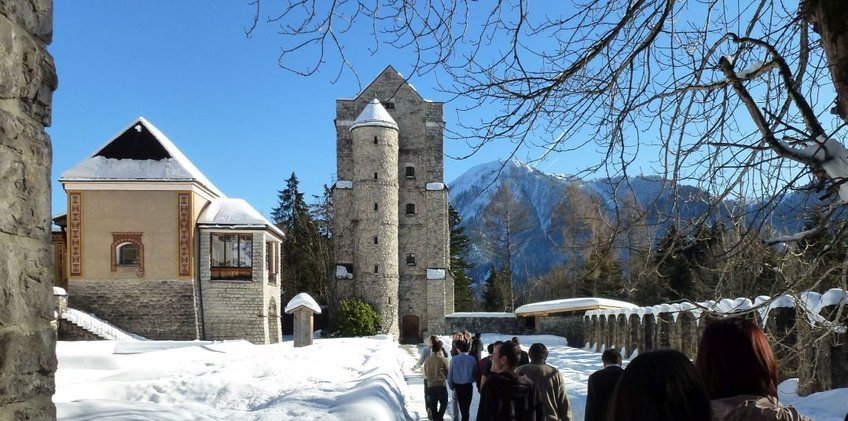
Winterschool on quantum effects and miniaturization in Mechanics, Fluidics, Optics and Electronics
Organized by: A.Fontcuberta, Ch.Galland, A.Radenovic (EPFL) and P.Fischer, H.Klauk (MPG)
Tagungsstätte Schloss Ringberg, Tegernsee, Bavaria, January 7-11, 2019
Sponsored by the Max Planck - EPFL Center for Molecular Nanoscience and Technology
During the past decades the size of machines and devices has been reduced from macroscopic sizes to the micrometer and in some cases even the nanometer scale. This technological progress concerns not only the often-quoted case of electronic components, but also many types of probes, actuators and analytical tools. The ongoing miniaturization is driven by technological advances, in which nanoscience and nanotechnology play a prominent role.
Size-reduction is not only an engineering challenge, but also results in new science. For instance, the physics of fluid flows at small scales results in entirely different properties compared to those of the macro-world. Biological and chemical nanomachines thus operate based on other principles compared to macroscopic machinery. Similarly, the laws of optics in the near-field enable new, ultrasensitive spectroscopic and imaging techniques, while quantum tunneling sets fundamental limits to electromagnetic field enhancement in sub-nanometer gaps, limiting the achievable signal in molecular spectroscopy. Mechanical properties are also dictated by quantum physics at the molecular scale, so that quantization of motion and momentum must be accounted for in nanoscale vibrational spectroscopy.
Clearly, entirely new opportunities arise in the development and realization of novel machines, tools and devices at the nanoscale, that operate on novel scientific and technological concepts.
The Winterschool of the MPS-EPFL-Center for Nanoscience and Technology in 2019 shall address the scientific aspects of miniaturization and of devices operating on small length scales. Participants will be introduced to experimental methods and the underlying principles in lectures by scientists who are actively involved in the development of nanoscalar technologies. In 13 blocks, each consisting of 1 full hour introductory and 1 full hour topical lecture, the Winterschool will address the following subjects:
Mechanics: e.g. mechanical (and molecular) resonators near the quantum limit and their coupling to optical fields.
Fluidics: e.g. motion control of swimmers, tiny particles and large molecules, and the principles of chemical nanomotors.
Optics: e.g. superresolution imaging of tissues and biological enzyme motors, near field sensing, nano-plasmonic and nano-optics, single molecule spectroscopy.
Electronics: e.g. energy conversion and storage, devices based on nanostructures and single organic molecules.
Confirmed lecturers :
| Javier Aizpurua | Center for Materials Physics, San Sebastian |
| Dean Astumian | University of Maine |
| Georg E. Fantner | EPF Lausanne |
| Peer Fischer | MPI for Intelligent Systems, Stuttgart |
| Anna Fontcuberta | EPF Lausanne |
| Christophe Galland | EPF Lausanne |
| Felix Gunkel | RWTH Aachen |
| Eric Keaveny | Imperial College London |
| Hagen Klauk | MPI for Solid State Research, Stuttgart |
| Emmanuel Lörtscher | IBM Zürich |
| Aleksandra Radenovic | EPF Lausanne |
| Jörg Schulze | Universität Stuttgart |
| Alessandro Siria | Ecole Normale Supérieure, Paris |
The Winterschool will take place at Schloss Ringberg on the banks of Tegernsee about 50 km south of Munich. Travel directions can be found here.The Winterschool will begin on Monday, January 7, around noon (arrival in the morning), and finishes on early Friday afternoon, January 11.
Contact: Klaus Kuhnke (k.kuhnke (at) fkf.mpg.de).